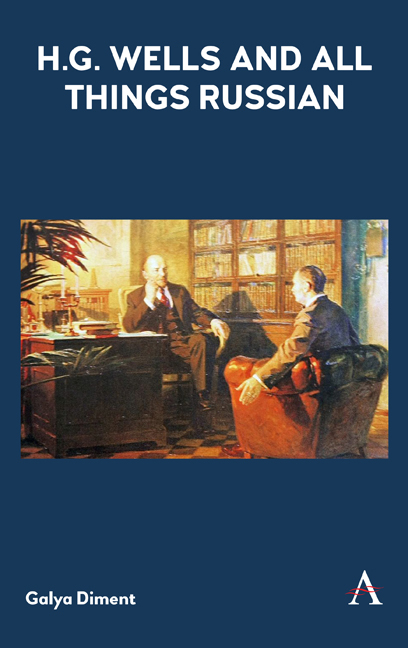Book contents
- Frontmatter
- Dedication
- Contents
- List of Illustrations
- Acknowledgments
- List of Contributors
- A Note on Transliteration
- Introduction: “The Wells Effect”
- Part One WELLS IN RUSSIA: PRE-WORLD WAR II
- Part Two WELLS IN RUSSIA: POST-WORLD WAR II
- Part Three RUSSIA IN WELLS
- APPENDIX TRANSLATIONS
- Appendix 1 V. D. Nabokov on Visiting H. G. Wells in England in 1916 (From Iz voiuiushchei Anglii, 41–51)
- Appendix 2 Alexander Amfiteatrov on Wells's 1920 Visit to Russia
- Appendix 3 Alexander Belyaev on the Wells-Lenin Debate about “Utopias”
- Appendix 4 Karl Radek and Solomon Lozovsky to Stalin
- Appendix 5 Yury Olesha on His Love for H. G. Wells (In Literaturnyi Kritik 12 (1935), 156–7)
- Appendix 6 Yuly Kagarlitsky on Being a Soviet Biographer of Wells
- Bibliography
- Wells, Herbert George – Works Index
- General Index
Appendix 5 - Yury Olesha on His Love for H. G. Wells (In Literaturnyi Kritik 12 (1935), 156–7)
from APPENDIX TRANSLATIONS
Published online by Cambridge University Press: 06 September 2019
- Frontmatter
- Dedication
- Contents
- List of Illustrations
- Acknowledgments
- List of Contributors
- A Note on Transliteration
- Introduction: “The Wells Effect”
- Part One WELLS IN RUSSIA: PRE-WORLD WAR II
- Part Two WELLS IN RUSSIA: POST-WORLD WAR II
- Part Three RUSSIA IN WELLS
- APPENDIX TRANSLATIONS
- Appendix 1 V. D. Nabokov on Visiting H. G. Wells in England in 1916 (From Iz voiuiushchei Anglii, 41–51)
- Appendix 2 Alexander Amfiteatrov on Wells's 1920 Visit to Russia
- Appendix 3 Alexander Belyaev on the Wells-Lenin Debate about “Utopias”
- Appendix 4 Karl Radek and Solomon Lozovsky to Stalin
- Appendix 5 Yury Olesha on His Love for H. G. Wells (In Literaturnyi Kritik 12 (1935), 156–7)
- Appendix 6 Yuly Kagarlitsky on Being a Soviet Biographer of Wells
- Bibliography
- Wells, Herbert George – Works Index
- General Index
Summary
Yury Olesha (1899– 1960) is one of the most prominent and original Russian writers of the twentieth century, his fame largely resting on his novel Envy (“Zavist’,” 1927), about the uneasy coexistence of the old and the new in the emerging Soviet society. His suggestion in “A Conversation with Readers” that the novel was influenced by Wells is particularly intriguing because by his artistic temperament Olesha was obviously a Modernist, while Wells was often seen by critics as anything but. Olesha's seemingly counterintuitive affinity with Wells is, in fact, quite similar to that of Vladimir Nabokov, to whom Olesha is frequently compared. Olesha does have some, albeit mild, fantastic elements in his prose, both in Envy and in his famous fairy tale, Three Fat Men (“Tri tolstiaka,” 1924). He survived the Stalin Purges but soon after this interview, where he freely talks about his love not just for Wells but for Europe as a whole, he was largely silenced until after Stalin's death in 1953. Envy was first published in English by Hogarth Press in 1936 (trans. Anthony Wolfe), a year after the “Conversation” appeared. We do not know if Wells ever read it.
A Conversation with Readers
[…]
Olesha: What does it mean to love a writer? Great writers are great. How can one not love Balzac, Shakespeare, Goethe? One can talk about some other attitude towards a writer. This other attitude arises when one finds in another writer something very close to yourself, something that is your own. This something yours you can find in a Balzac masterpiece or in some worthless work. Okay, let's call it one's love for a writer. From that point of view I “love” Wells most. Herbert Wells. You know— the author of The Invisible Man, The War of the Worlds, The First Men in the Moon. For me this makes him a truly great writer. He describes fantastic events. Something that never happened. Martians descended on Earth. The Conquering of the Earth by Martians. Or a trip to the Moon. Two people on the Moon. Or an invisible man. The scary life of an invisible man.
- Type
- Chapter
- Information
- H. G. Wells and All Things Russian , pp. 201 - 204Publisher: Anthem PressPrint publication year: 2019



